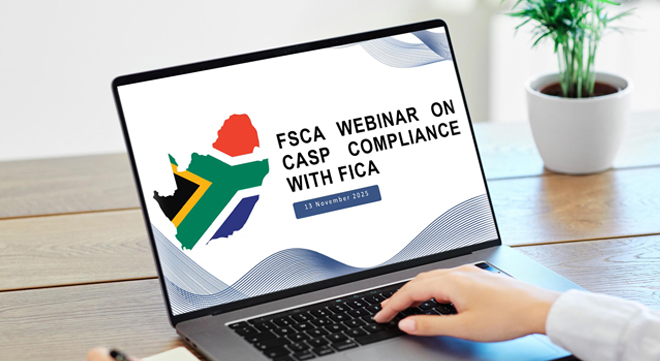
FSCA licenses most crypto provider applicants – as enforcement tightens
The rising number of investigations and inspections underline a shift from registration to active supervision.

The rising number of investigations and inspections underline a shift from registration to active supervision.

From 1 March, new frameworks will impose expanded due diligence and information-exchange obligations on exchanges, custodians and banks.

The FSCA has uploaded recordings of its five-part webinar series aimed at helping CASPs meet their FICA obligations.

Top domestic Bitcoin wallets moved nearly R63bn offshore since 2019, spurring the SARB and Treasury to develop a cross-border crypto transaction framework.

The Authority has told all crypto asset service providers to complete a comprehensive questionnaire on their business activities and risk management practices.

The SARB will publish targeted frameworks to govern cross-border crypto flows and CASP reporting, says the Minister of Finance.

Nine steps financial services and crypto asset providers can take to curb the deceptive use of their name and branding.

From funeral policy breaches to crypto non-compliance and weak AML measures, the regulator’s latest report outlines its key priorities – with online harm topping the list.

Whether clients are long-term holders of crypto or occasional traders, transparency now is better than an audit later.

A revamped licensing schedule and an enhanced Integrated Regulatory Solution platform will form the backbone of COFI-aligned supervision.

Financial institutions that proactively embed governance, technology, and culture to meet evolving regulatory standards will not only avoid penalties but also strengthen credibility, build resilience, and drive long term value.

The FSCA and the FIC remind CASPs and FSP CASPs of the compliance requirements that take effect on 30 April.

Unathi Kamlana says the Authority will support the integration of advanced technologies and strengthen frameworks for consumer protection, cyber resilience, and financial inclusion.

Of the 420 CASP licence applications received, nine were declined, while 106 applications were voluntarily withdrawn.

Starting 30 April 2025, CASPs and FSPs will have to collect and share detailed client information when engaging in crypto transfers.

The Authority gives crypto asset service providers a seven-month reprieve.

As the regulatory framework develops, many questions remain – particularly around whether all tokens, from fungible coins to unique NFTs, will be regulated the same way.